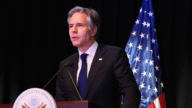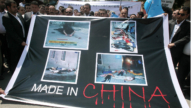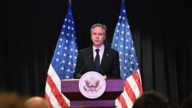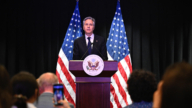【新唐人2014年02月13日訊】繼美國參議員指責中共對和平構成威脅後,週二在美國國會參議院軍事委員會的聽證會上,美國情報官員再次指出,美國正面臨幾十年來最多樣化的安全威脅,他認為主要威脅涉及中共的軍事和網絡攻擊,以及在東亞地區的挑釁行為。
2月11號,美國國會參議院軍事委員會,針對「國家安全面臨的威脅」召集聽證會。美國情報總監詹姆斯•克拉珀(James Clapper)說,美國正面臨空前的安全威脅。
克拉珀列舉了對美國安全造成威脅的清單,其中包括隱藏在美國的恐怖份子,中東和北非地區的激進份子,以及來自中共的網絡和軍事威脅。
國防情報局局長弗林(Michael Flynn)在聽證會上說,中共前不久宣佈設立「東海防空識別區」的舉動,加劇了緊張局勢,可能會損害這一地區的和平與安全。
參議院軍事委員會主席卡爾•萊文則說,中共對美國的網絡威脅,以及毫無收斂的竊取美國的技術,和生產冒牌貨,可能更加有害。
美國中文雜誌《中國事務》總編輯伍凡:「現在國土安全也好,情報機構的首腦,出來到國會去作證,也要提醒國會,你們撥款的時候千萬不要再砍軍費了,不要砍情報費了,要把美國保護安全作為第一的首要的任務,所以軍費上你們要手下留情。」
美國中文雜誌《中國事務》總編輯伍凡表示,美國經濟雖然在復甦,但是還欠了很多國債,前幾年就在縮減軍費,而中共正在全力的發展軍事,今年軍費增加了10%。
2月12號,《美國之音》報導說,中共的國防預算今年將增加到8000多億人民幣。中共官方公布的2013年的國防開支是7200億人民幣。
「全球自由信息運動」創辦人張新宇分析指出,不管中共投入多少軍費,如果真正開戰,美國並不認為中共會有威脅,但是中共發動的大規模網絡攻擊,和間諜活動等,美國則防不勝防。
全球自由信息運動創辦人張新宇:「比如說拉登中東這種恐怖主義思想,其實它們要比強大的話,中東也沒有美國強大,但它卻實實實在在的對美國安全造成一種威脅,再說它們這種勢力是恐怖行為,是超限的,不按規矩的,而且有一種突發性,或者隱蔽性等等。」
張新宇指出,如果美國現在不把中共一些危險活動,列為威脅的話,很可能演變成更大的安全威脅。
張新宇:「你比如說網絡攻擊,它可以癱瘓美國的電力供應,還有美國政府的日常運作的這些系統﹔還有比如說,偷盜美國的這些技術的話,你如果不去防範,那麼它就會讓中共抄襲美國的東西,然後拿美國的技術來對付美國,任其發展也會把美國癱瘓。」
去年2月,美國電腦安全公司Mandiant發佈研究報告說,中共軍隊的秘密部隊捲入針對美國公司的網絡間諜行動。Mandiant報告當中含有被控部隊總部的大樓照片。去年5月,美國國防部點名指責中共網絡攻擊。
隨著間諜活動的不斷擴大,中共從過去偷軍事情報、商業情報,近年來則偷起了農業產品等情報。美國媒體報導說,北京「金色農華種業公司」的6名中國籍員工,被指控竊取美國已取得專利的玉米種子。
伍凡指出,911事件中,10多個恐怖份子就把美國攪得全國恐慌,而中共發動大規模間諜活動則更危險。
伍凡:「中共它不是提出要超限戰嘛,採取一切人們想像不到的手段來發動攻擊,那它用自己比較小的力量,它攻擊你認為最薄弱的環節,用這種手段以小搏大,以弱搏強。」
不過,中共拒絕承認對美國採取過任何網絡攻擊和間諜活動,並指責美國「賊喊捉賊」,同時,中共也拒絕接受美國對它「東海防空識別區」的指責。那麼,又是誰作賊而喊捉賊呢?
採訪編輯/李韻 後製/舒燦
U.S. Security Faces Chinese Military and Cyber Threats
Following a U.S. senator accusing the Communist regime a
rising threat to peace, on Tuesday´s Annual Threat Assessment
Hearing before the Senate Armed Services Committee,
the intelligence director said that the U.S. is faced
with a growing list of increasingly complex security threats.
Among which, military and cyber attacks from the Communist
regime along with its threats to East Asia are the main concerns.
The Annual Threat Assessment Hearing before the Senate
Armed Services Committee took place on February 11.
Director of National Intelligence James Clapper said that
the U.S. is facing unprecedented security threats.
In Clapper´s listed threats are the terrorists hiding in the United
States, militants in the Middle East and North Africa regions,
as well as cyber and military threats from the Chinese Communist
Party (CCP).
DIA Director Army Lt. Gen. Michael Flynn said the CCP´s
air-identification zone over portions of the East China Sea
raised regional tensions, and increased the risk of incidents that
could undermine peace and security in that vital region.
Chair of the Senate Armed Services Committee, Carl Levin
said that the CCP poses a unique threat to the U.S. because of
“a lack of restraint and respect for any limits on the theft of
American technology, including production of counterfeit products.”
Chris Wu, editor-in-chief of China Affairs magazine:
“The testimony of the Homeland Security or the intelligence
agencies is also to remind the Congress not to cut the funding
for the military or for the intelligence.
The safety and security of the United States is a first priority."
China Affairs magazine editor-in-chief Chris Wu indicates that
the U.S. has been cutting military budgets since a few years ago,
however, the CCP has been expanding its military development
with a 10% budget increase this year.
Voice of America reported on Feb. 12 that the CCP’s defense
budget this year will increase to more than 800 billion yuan
from last year´s 720 billion yuan.
Global Information Freedom Movement founder Zhang Xinyu
analyzes the U.S. will not consider the CCP a threat should a
war erupt regardless of the budget CCP will input.
However, the massive cyber attacks and espionage are hard to
prevent.
Zhang Xinyu, founder of Global Information Freedom Movement:
“Take bin Laden as an example, it is not as strong as the U.S.,
but it poses a threat, especially its terrorist acts are extreme,
irregular, abrupt and hidden."
Zhang Xinyu indicates that the CCP will pose greater threats
should the U.S. ignore some of its dangerous conduct.
Zhang Xinyu: “The cyber attacks, for instance, can paralyze the
U.S. power supply and governmental functions.
With the theft of technology, the CCP will turn it around and
use it against the U.S. causing the collapse of the U.S. systems.
It can not just be left without any prevention."
Last February, cyber security company Mandiant Corp published
a report that purportedly traced a series of cyber attacks on U.S.
companies to a Shanghai-based unit of the Chinese army.
Attached with the report is a photo showing part of the secretive
Chinese military unit.
The US defense department also named China as the source of
cyber attacks.
The espionage of the CCP has ranged from the military to
business.
Recently, agriculture has become another target of intelligence.
A media report revealed six Chinese citizens from Beijing Kings
Nower Seed company have been accused of stealing U.S.
patented corn seed.
Chris Wu points out that a dozen of terrorists caused a national
panic during the 911 incident.
The CCP´s massive espionage is even more dangerous.
Chris Wu: “The CCP brags about unrestricted warfare, a type
of attack with means beyond the imagination.
They employ minor effort to attack the weakest link."
Meanwhile, the CCP denied engaging in the cyber attacks and
espionage against the United States and claimed themselves
the victim of hacking.
CCP also rejected the accusation over the recent declaration
of an air defense identification zone.
So, who exactly is the victim?
Interview & Edit/LiYun Post-Production/ShuCan





























